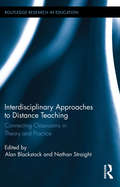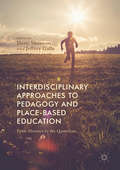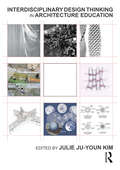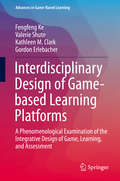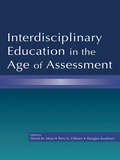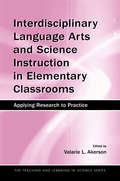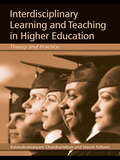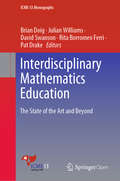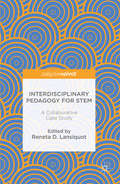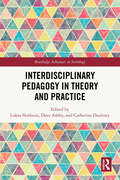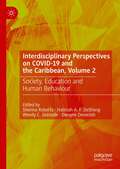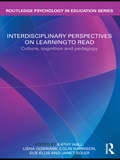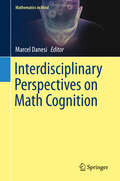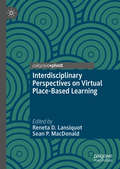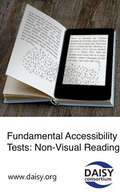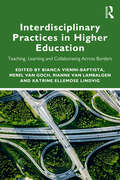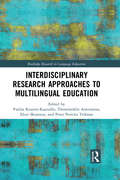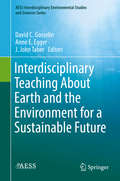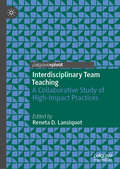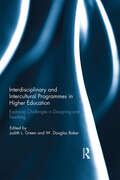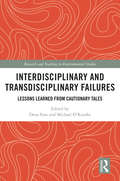- Table View
- List View
Interdisciplinary Approaches to Distance Teaching: Connecting Classrooms in Theory and Practice (Routledge Research in Education)
by Nathan Straight Alan BlackstockSynchronous technologies, particularly interactive video conferencing (IVC), are becoming common modes of teaching and delivering college courses. The increasing popularity of IVC in the U.S. and abroad calls for more pedagogically effective practices for instructors using this technology. This volume focuses on innovative and proven approaches to IVC teaching in a variety of disciplines: English, history, biology, chemistry, geology, engineering, social work, and elementary and special education. Contributors hail from a pioneering university at the forefront of distance education and understand the practice and potential of IVC teaching at the highest levels. Chapters outline the challenges and benefits of IVC teaching from pedagogical, technical, and administrative perspectives.
Interdisciplinary Approaches to Pedagogy and Place-Based Education
by Deric Shannon Jeffery GalleThis book brings together scholars from a wide range of disciplines to creatively engage with place in the context of pedagogy. Beginning with an exploration of traditional place-based forms of education, such as outdoor education, travel courses, and courses on sustainability, the authors go on to expand our popular notions of place, including the classroom, the campus, our interior selves, and our digital ecosystems. This reconsideration of place-based education represents not only an engagement of prior literature on pedagogy and place, but also a re-imagining of the role that place might play in education. Authors stretch the notion of place, arguing for a holistic approach to disciplines in the humanities, social sciences, and natural sciences, bringing into focus an array of contentious issues in philosophies and methods of teaching for multiple academic disciplines and their many intersections.
Interdisciplinary Design Thinking in Architecture Education
by Kim, Julie Ju-YounThis book explores the creative potential for architecture curricula to integrate solid interdisciplinary thinking in design studio education. Annotated case studies, both from academic institutions and from professional practices, provide examples of interdisciplinary engagement in creative design work, highlighting the challenges and opportunities of this approach. Cases are from a diverse selection of international collaborators, featuring projects from the United States, Australia, Mexico, Germany, and Italy, and cover a range of project types and scales. Chapters by invited experts offer speculations on current and future models, situating examples within the broader context, and encouraging dialogue between practice and pedagogy. The collection of voices in this book offers critical and provocative lenses, learning from history while forging inventive and creative roles for the architect as practitioner, entrepreneur, strategist, choreographer, activist, facilitator, leader, and teacher. Interdisciplinary Design Thinking provides insights into the potential of interdisciplinary engagement at the level of foundational undergraduate education, making it ideal for faculty in architecture schools. It will also be of interest to design professionals concerned with interdisciplinary collaboration and how to incorporate similar efforts in their own practices.
Interdisciplinary Design Thinking in Architecture Education
by Kim, Julie Ju-YounThis book explores the creative potential for architecture curricula to integrate solid interdisciplinary thinking in design studio education.Annotated case studies, both from academic institutions and from professional practices, provide examples of interdisciplinary engagement in creative design work, highlighting the challenges and opportunities of this approach. Cases are from a diverse selection of international collaborators, featuring projects from the United States, Australia, Mexico, Germany, and Italy, and cover a range of project types and scales. Chapters by invited experts offer speculations on current and future models, situating examples within the broader context, and encouraging dialogue between practice and pedagogy. The collection of voices in this book offers critical and provocative lenses, learning from history while forging inventive and creative roles for the architect as practitioner, entrepreneur, strategist, choreographer, activist, facilitator, leader, and teacher.Interdisciplinary Design Thinking provides insights into the potential of interdisciplinary engagement at the level of foundational undergraduate education, making it ideal for faculty in architecture schools. It will also be of interest to design professionals concerned with interdisciplinary collaboration and how to incorporate similar efforts in their own practices.
Interdisciplinary Design of Game-based Learning Platforms: A Phenomenological Examination of the Integrative Design of Game, Learning, and Assessment (Advances in Game-Based Learning)
by Fengfeng Ke Kathleen M. Clark Valerie Shute Gordon ErlebacherThis book represents a four-year research and development project. It presents a phenomenological examination and explanation of a functional design framework for games in education. It furnishes a rich description of the experiences and perceptions of performing interdisciplinary collaborative design among experts of very diverse fields, such as learning systems design, architectural design, assessment design, mathematics education, and scientific computing.
Interdisciplinary Education in the Age of Assessment
by Terry A. Osborn David M. Moss Douglas KaufmanInterdisciplinary Education in the Age of Assessment addresses a prevalent need in educational scholarship today. Many current standards-driven curricula follow strict subject-specific guidelines, leaving educators little room for interdisciplinary innovation. This book gears itself toward developing assessment models specific to interdisciplinary education, positioning itself as a seminal volume in the field and a valuable resource to educators across the disciplines. Each chapter covers a major subject area (literacy, science, math, social studies, bilingual education, foreign language, educational policy) and discusses methods of assessing integrated/ interdisciplinary curriculum and instruction.
Interdisciplinary Language Arts and Science Instruction in Elementary Classrooms: Applying Research to Practice (Teaching And Learning In Science Ser.)
by Valarie L. AkersonThis volume brings together evidence-based approaches to interdisciplinary language arts and science instruction. Firmly grounded in the research showing cognitive parallels between the two subjects, and reflecting the many recommendations in recent years for using interdisciplinary instruction at the elementary level, its goal is to help teachers effectively use this kind of instruction in elementary classrooms. The book is organized around three themes:*Introduction to Interdisciplinary Science and Language Arts Instruction;*The Influence of Interdisciplinary Science and Language Arts Instruction on Children’s Learning; and*Research on Preparing Elementary Teachers to Use Interdisciplinary Science and Language Arts Instruction Each chapter summarizes the research on its focal topic. Examples of research applied to practice, and questions and prompts for discussion and reflection help readers apply what they are reading in their own classroom contexts. Teacher educators and prospective and practicing elementary teachers everywhere will benefit from this overview of current research and practice in interdisciplinary science and language arts instruction.
Interdisciplinary Learning and Teaching in Higher Education: Theory and Practice
by Stephen Fallows Balasubramanyam ChandramohanAs universities increasingly offer courses that break the confines of a single subject area, more students are enrolling on interdisciplinary programmes within multidisciplinary departments. Teaching and learning within interdisciplinary study requires new approaches, including an understanding of the critical perspectives and frameworks and the rearranging of intellectual and professional boundaries. Interdisciplinary Learning and Teaching in Higher Education explores the issues and tensions provoked by interdisciplinary learning, offering helpful information for: Staff development Distance learning Mass communication courses Interdisciplinary science courses Grounded in thorough research, this collection is the first of its kind to provide practical advice and guidance from around the world, improving the quality of teaching and learning in interdisciplinary programmes.
Interdisciplinary Mathematics Education: A State Of The Art (ICME-13 Monographs)
by David Swanson Julian Williams Brian Doig Rita Borromeo Ferri Pat DrakeThis open access book is the first major publication on the topic of “Interdisciplinary Mathematics Education” and arose from the work of the first International Topic Study Group of the same name at the ICME-13 conference in Hamburg in 2016. It offers extensive theoretical insights, empirical research, and practitioner accounts of interdisciplinary mathematics work in STEM and beyond (e.g. in music and the arts). <P><P> Scholars and practitioners from four continents contributed to this comprehensive book, and present studies on: the conceptualizations of interdisciplinarity; implementation cases at schools and tertiary institutions; teacher education; and implications for policy and practice. Each chapter, and the book itself, closes with an assessment of the most significant aspects that those involved in policy and practice, as well as future researchers, should take into account.
Interdisciplinary Pedagogy for STEM
by Reneta D. LansiquotThis book focuses on constructivist theory and collaborative interdisciplinary studies, showing how constructivist theory complements interdisciplinary studies. Constructivist theory stresses how learners construct new ideas and concepts, while the interdisciplinary method requires that learners approach complex problems from multiple perspectives. The author uses the New York City College of Technology as a model to demonstrate how learning can be embedded in complex, realistic, and relevant environments. As a result, students learn to consider significant issues from a variety of viewpoints and thus negotiate their social landscape. In approaching problems that they recognize as meaningful, they take ownership of their learning and become increasingly self-aware. This scholarly book makes a theoretical contribution to its field while also offering a practical, real world example of how to successfully integrate a curriculum.
Interdisciplinary Pedagogy in Theory and Practice (Routledge Advances in Sociology)
by Catherine Duxbury Lukas Slothuus Dave AshbyThis book explores interdisciplinary university teaching in both theory and practice, drawing on the experience and expertise of educators from across the social sciences and humanities. Based around pedagogical theory and concrete practical examples and experiences from the classroom, the book contributes with a multiplicity of knowledge to the growing appetite for interdisciplinary initiatives at universities.The book is unique in offering depth and breadth of analysis of one of the most prominent experiments of interdisciplinary social science and humanities education in Britain, namely LSE100: The LSE Course, an interdisciplinary course taken by all undergraduates across disciplines at the London School of Economics and Political Science (LSE). The course has three streams, each addressing a major challenge of our time: The climate crisis, fairness, and artificial intelligence (AI).The book is of interest to academics, educators, and university leaders curious about developing and implementing interdisciplinary education in their own contexts, as well as to anyone interested in understanding the dynamics and challenges at stake in interdisciplinary educational settings. Finally, it appeals to students seeking to broaden their understanding of the social sciences beyond their own discipline.
Interdisciplinary Perspectives on COVID-19 and the Caribbean, Volume 2: Society, Education and Human Behaviour
by Sherma Roberts Halimah A. F. DeShong Wendy C. Grenade Dwayne DevonishCaribbean countries have had to navigate multiple crises, which have tested their collective resolve through time. In this regard, the region’s landscape has been shaped by an interplay of vulnerability and resilience which has brought to the fore possibilities and contradictions. It is within this context that the effects of the COVID-19 pandemic must be considered. Interdisciplinary Perspectives on COVID-19 and the Caribbean, Volume 2: Society, Education and Human Behaviour provides a comprehensive, multi- and interdisciplinary assessment of the impact of the COVID-19 pandemic, using the Caribbean as the site of enquiry. The edited collection mobilises critical perspectives brought to bear on research produced within and beyond the boundaries and boundedness of conventional academic disciplinary divides, in response to the multi-dimensional crises of our time. This volume is divided into four (4) parts consisting of twenty-three (23) chapters and weaves together four broad thematic strands: COVID-19 and Caribbean Society; COVID-19 Religion and Rights; Psycho-social Impacts of COVID-19; and Education, Innovation, and Technology. Authors working within and across the human, social, physical and life sciences consider the myriad effects of the health crisis in the region, interrogating these experiences from the granular to macro level, utilising inter and multidisciplinary lenses. Collectively, the chapters which constitute Volume II expose the fault lines in Caribbean societies, which are deeply rooted in the region’s history and delineate the precise ways in which the pandemic has transformed lives and livelihoods in the region. The culmination of this collection offers a reimagining of our Caribbean contemporary futures in the hope of finding home-grown solutions, avenues and possibilities.
Interdisciplinary Perspectives on Learning to Read: Culture, Cognition and Pedagogy
by Colin Harrison Sue Ellis Kathy Hall Usha Goswami Janet SolerInterdisciplinary Perspectives on Learning to Read brings together different disciplinary perspectives and studies on reading for all those who seek to extend and enrich the current practice, research and policy debates. The breadth of knowledge that underpins pedagogy is a central theme and the book will help educators, policy-makers and researchers understand the full range of research perspectives that must inform decisions about the development of reading in schools. The book offers invaluable insights into learners who do not achieve their full potential. The chapters have been written by key figures in education, psychology, sociology and neuroscience, and promote discussion of: comprehension gender and literacy attainment phonics and decoding digital literacy at home and school bilingual learners and reading dyslexia and special educational needs evidence based literacy visual texts. This book encompasses a comprehensive range of conceptual perspectives on reading pedagogy and offers a wealth of new insights to support innovative research directions.
Interdisciplinary Perspectives on Math Cognition (Mathematics in Mind)
by Marcel DanesiThis is an anthology of contemporary studies from various disciplinary perspectives written by some of the world's most renowned experts in each of the areas of mathematics, neuroscience, psychology, linguistics, semiotics, education, and more. Its purpose is not to add merely to the accumulation of studies, but to show that math cognition is best approached from various disciplinary angles, with the goal of broadening the general understanding of mathematical cognition through the different theoretical threads that can be woven into an overall understanding.This volume will be of interest to mathematicians, cognitive scientists, educators of mathematics, philosophers of mathematics, semioticians, psychologists, linguists, anthropologists, and all other kinds of scholars who are interested in the nature, origin, and development of mathematical cognition.
Interdisciplinary Perspectives on Virtual Place-Based Learning
by Reneta D. Lansiquot Sean P. MacDonaldThis book explores how virtual place-based learning and research has been interpreted and incorporated into learning environments both within and across disciplinary perspectives. Contributing authors highlight the ways in which they have employed a variety of methodologies to engage students in the virtual exploration of place. In the process, they focus on the approaches they have used to bring the real world closer through virtual exploration. Chapters examine how the resources of the urban environment have been tapped to design student research projects within the context of an interdisciplinary course. In this way, authors highlight how virtual place-based learning has employed the tools of mapping and data visualization, information literacy, game design, digital storytelling, and the creation of non-fiction VR documentaries. This book makes a valuable contribution to the literature, offering a model of how the study of place can be employed in creative ways to enhance interdisciplinary learning.
Interdisciplinary Practices in Academia: Writing, Teaching and Assessment (Routledge Studies in Applied Linguistics)
by Louisa Buckingham Jihua Dong Feng Kevin JiangThis volume addresses the implications that academic interdisciplinarity in the field of English for Academic Purposes (EAP) and English for Specific Purposes (ESP) has for research and pedagogy with a global reach. The Editors present a coherent, research-supported analysis of the influence of interdisciplinary research and methods on the way academics collaborate on courses, develop their careers, and teach students. The hitherto prevalence of disciplinary silo-like approaches to academic and scientific issues is increasingly ceding ground to an interdisciplinary synergy of different methodological and epistemological traditions. In the context of ongoing trends towards interdisciplinarity in degree programmes and the increasing popularity of such degree programmes with students (e.g., bioinformatics, computational linguistics, psycholinguistics, neuropolitics, evolutionary finance, global studies, and security studies), academics and programme administrators need awareness of the skills needed to operate in interdisciplinary contexts. Studies in this edited volume examine interdisciplinary communication practices, and identify how academic writing, teaching, language proficiency assessment and degree programmes are responding to changes in the broader social, institutional and political contexts of academia. As authors in the volume demonstrate, the discursive features, literacy practices and instructional modes, and the student experience of these emerging interdisciplines deserve systematic exploration. This insightful volume sheds light on contexts across the globe and will be used by students studying EAP and ESP pedagogy or practice; academics in the fields of applied linguistics and higher education, as well as higher education faculty and administrators interested in interdisciplinarity in degree programmes.
Interdisciplinary Practices in Higher Education: Teaching, Learning and Collaborating Across Borders
by Bianca Vienni-Baptista Merel Van Goch Rianne Van Lambalgen Katrine Ellemose LindvigDrawing on eight crowdsourced cases, Interdisciplinary Practices in Higher Education demonstrates the range and diversity in approaches to teaching, learning and collaborating across disciplinary and institutional borders. The cases explore everyday challenges within interdisciplinary higher education experiences such as designing study programmes, planning curricula, ensuring sufficient assessment and feedback for diverse groups of students and coordinating and aligning expectations with external stakeholders. Each case is analysed by three leading experts, providing solutions and practical guidance to support practice.Chapters explore the challenges of: Breadth versus depth in interdisciplinary teaching and learning activities Disciplinary identities in interdisciplinary collaborations The governance and administration of interdisciplinary courses and study programmes Career trajectories for interdisciplinary researchers Aligning expectations with stakeholders in transdisciplinary endeavours A highly practical, solution-based book, this is an essential read for lecturers, students, researchers and others who might wish to embark on an interdisciplinary path or develop future border-crossing practices within their higher education institutions.
Interdisciplinary Research Approaches to Multilingual Education (Routledge Research in Language Education)
by Peter Pericles Trifonas Themistoklis Aravossitas Vasilia Kourtis-Kazoullis Eleni SkourtouRecently intensified global mobility has reinforced the interest for ethnolinguistic diversity and multilingualism in education and society. Interdisciplinary Research Approaches to Multilingual Education brings together current interdisciplinary perspectives in multilingual and second language education to examine research and language teaching in specific countries, as well as different aspects of multilingual education that include language policies and ICT applications. Containing context-specific practical interventions and relevant theoretical approaches, it considers the contemporary challenges of language policies and practices to inform teacher and curriculum development based on international empirical research. The chapters of this book are centered around the following themes: Educational programs and policies Teaching and learning Linguistic diversity ICT and language learning This book will be of great interest to academics, researchers and postgraduate students in language education, bilingual education, second/foreign language learning, CALL, and applied linguistics. It will also appeal to educational administrators and those involved with language education policies.
Interdisciplinary Teaching About Earth and the Environment for a Sustainable Future (AESS Interdisciplinary Environmental Studies and Sciences Series)
by David C. Gosselin Anne E. Egger J. John TaberInterdisciplinary Teaching about the Earth and Environment for a Sustainable Future presents the outcomes of the InTeGrate project, a community effort funded by the National Science Foundation to improve Earth literacy and build a workforce prepared to tackle environmental and resource issues. The InTeGrate community is built around the shared goal of supporting interdisciplinary learning about Earth across the undergraduate curriculum, focusing on the grand challenges facing society and the important role that the geosciences play in addressing these grand challenges. The chapters in this book explicitly illustrate the intimate relationship between geoscience and sustainability that is often opaque to students. The authors of these chapters are faculty members, administrators, program directors, and researchers from institutions across the country who have collectively envisioned, implemented, and evaluated effective change in their classrooms, programs, institutions, and beyond. This book provides guidance to anyone interested in implementing change—on scales ranging from a single course to an entire program—by infusing sustainability across the curriculum, broadening access to Earth and environmental sciences, and assessing the impacts of those changes.
Interdisciplinary Team Teaching: A Collaborative Study of High-Impact Practices
by Reneta D. LansiquotThis book explores the community of practice at New York City College of Technology engaged in interdisciplinary team teaching. Professors report on their high-impact practices when they combine the assets of different disciplines. Chapters feature examples of the innovative curriculum resulting from a true interdisciplinary system, including place-based learning. The book also discusses questions of validity and measuring the influence of high-impact practice within interdisciplinary co-teaching.
Interdisciplinary Thinking for Schools: Ethical Dilemmas MYP 1, 2 & 3
by Dr. Meredith Harbord Meredith J Harbord Sara Riaz KhanInterdisciplinary Thinking for Schools: Ethical Dilemmas MYP 1, 2 & 3 is not your average textbook resource. Innovative ethical design projects illustrated with spectacular artwork will connect students to exciting and purposeful learning. Rich primary research includes interviews with the following visionaries: Alberto Alessi, Astronomer Royal Martin Rees, Dr. Jane Goodall, Jared Della Valle and the Stephanie Alexander Kitchen Garden Foundation. The interdisciplinary units have been written with a focus on creativity, critical thinking and exploration of embedded ethical dilemmas. Our strategies support the growth of an innovative and student-centered curriculum to generate real world, sustainable solutions to problems in keeping with the IB MYP philosophy.
Interdisciplinary Thinking for Schools: Ethical Dilemmas MYP 1, 2 & 3
by Meredith J Harbord Sara Riaz KhanInterdisciplinary Thinking for Schools: Ethical Dilemmas MYP 1, 2 & 3 is not your average textbook resource. Innovative ethical design projects illustrated with spectacular artwork will connect students to exciting and purposeful learning. Rich primary research includes interviews with the following visionaries: Alberto Alessi, Astronomer Royal Martin Rees, Dr. Jane Goodall, Jared Della Valle and the Stephanie Alexander Kitchen Garden Foundation. The interdisciplinary units have been written with a focus on creativity, critical thinking and exploration of embedded ethical dilemmas. Our strategies support the growth of an innovative and student-centered curriculum to generate real world, sustainable solutions to problems in keeping with the IB MYP philosophy.
Interdisciplinary Thinking for Schools: Ethical Dilemmas MYP 4 & 5
by Meredith J Harbord Sara Riaz Khan Dr Meredith HarbordInterdisciplinary Thinking for Schools: Ethical Dilemmas MYP 4 & 5 continues on from Interdisciplinary Thinking for Schools: Ethical Dilemmas MYP 1, 2 & 3 and like the first book it is not your average textbook resource.Innovative ethical design projects illustrated with spectacular artwork will connect students to exciting and purposeful learning.Rich primary research includes interviews with the following visionaries: Alberto Alessi, Astronomer Royal Martin Rees, Dr. Jane Goodall, Jared Della Valle and the Stephanie Alexander Kitchen Garden Foundation. The interdisciplinary units have been written with a focus on creativity, critical thinking and exploration of embedded ethical dilemmas. Our strategies support the growth of an innovative and student-centered curriculum to generate real world, sustainable solutions to problems in keeping with the IB MYP philosophy.The authors Dr. Meredith J Harbord and Sara Riaz Khan, are two experienced MYP design teachers whose approach advocates respect for oneself, the community and the world.
Interdisciplinary and Intercultural Programmes in Higher Education: Exploring Challenges in Designing and Teaching
by Judith L. Green W. Douglas BakerAt the centre of this book is the exploration of how logic-in-use both leads to a particular understanding of the phenomena of interest (such as opportunities for learning specific processes) and shapes a particular view of what evidence counts in constructing claims. The contributions brought together here invite readers to explore the processes involved in developing and studying educational innovations, and to undercover the interdependent conceptual and epistemological actions, processes and practices of instructors, programme developers and students.Taken together, the book brings forward an argument related to the reflexive turn – the understanding that researchers in the social sciences construct, rather than find, phenomena of interest. Therefore, this book creates the potential to examine not only the logic-in-use developed by different researchers, but also to examine the complex nature of particular phenomena of interest to the researcher themselves. This book was originally published as a special issue of Pedagogies: An Educational Journal.
Interdisciplinary and Transdisciplinary Failures: Lessons Learned from Cautionary Tales (Research and Teaching in Environmental Studies)
by Dena Fam and Michael O’RourkeUnlike other volumes in the current literature, this book provides insight for interdisciplinary and transdisciplinary researchers and practitioners on what doesn’t work. Documenting detailed case studies of project failure matters, not only as an illustration of experienced challenges but also as projects do not always follow step-by-step protocols of preconceived and theorised processes. Bookended by a framing introduction by the editors and a conclusion written by Julie Thompson Klein, each chapter ends with a reflexive section that synthesizes lessons learned and key take-away points for the reader. Drawing on a wide range of international case studies and with a strong environmental thread throughout, the book reveals a range of failure scenarios for interdisciplinary and transdisciplinary projects, including: • Projects that did not get off the ground; • Projects that did not have the correct personnel for specified objectives; • Projects that did not reach their original objectives but met other objectives; • Projects that failed to anticipate important differences among collaborators. Illustrating causal links in real life projects, this volume will be of significant relevance to scholars and practitioners looking to overcome the challenges of conducting interdisciplinary and transdisciplinary research.
